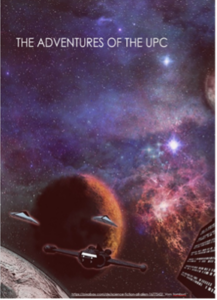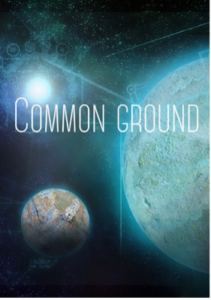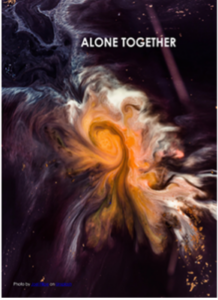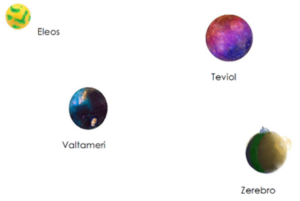If you want to go where no man has gone before, why not try your hand at collaborative writing? The idea is simple: Combine various types of writing in an elective course with a deep understanding of a specific theory. The seminar, “Where no man has gone before: Women and Science Fiction,” was my attempt to have students not only apply various forms of writing but also gain a deeper knowledge of intersectionality using social science fiction – with a dose of creativity. Just look at these student-produced project covers!
In the first half of the class, I familiarized students with social science fiction that looks at how technology or alien encounters affect our culture, social structure, and future society. Science fiction writing reflects current fears and hopes of contemporary society. To get students thinking along these lines, I asked them to write down societal topics they are interested in and feel will change. We found these themes in stories and movies in this genre.
To prepare for the written assignment, we also looked at register and tone in blogs, both professional and personal, as well as academic texts, journals, and newspapers. Students reflected on word usage, sentence structures, and the impact it had on them. Finally, we arrived at intersectionality according to K.W. Krenshaw’s and P.H. Collins’s take on Black feminist theory. Many of my students were not from the humanities and encountered this concept for the first time.
After seven weeks, it was time to get down to the nitty-gritty: a pen-and-paper role-playing game (RPG) – think dungeons and dragons. Shock: Social Science Fiction, written by Joshua A.C. Newman, listed books which inspired the game. Each of the groups, consisting of an equal number of humanities and science majors, had to create their own world. They used world-building templates I had pieced together from several sources to make sure the basics in culture, climate, conflict, society, and government were covered. Additionally, they had to name and portray the character who would represent this planet. This was a ‘work in progress’ as students had to adjust these templates once they started working with their worlds.
After they set up their worlds, they became representatives at a kind of United Nations for planets (UPC). Participants from each world were placed on four committees of their choosing. Their first task was to talk in general terms about one of these topics: gender, technology, climate, or immigration. They then had to write a personal blog using a combination of informal and neutral language. This first assignment received feedback but was not graded.
After a total of three ‘committee’ meetings, students wrote a formal report to their superior and then an official blog. These were based on issues that were the societal topics students wrote down in the beginning and included gender, environment, epidemics, and immigration. Once each person on the committee dealt with the ‘issue’ and wrote about it, the group looked at what role intersectionality played. Who was discriminated against? Who was forgotten? What consequences were overlooked? How many well-intentioned solutions turned out to be detrimental to those not in power?
Additionally, students worked in their initial world building groups to adjust the original setup and create a planet dossier. I asked the planet groups to discuss how their character experienced or saw intersectionality. These discussions proved to be the most fruitful. Here students saw how people in power overlook or abuse others (one student chose to play the villain). They realized that all people need a voice. This not only validated the theory of intersectionality for my students but also showed how much it’s needed in society.
After peer editing, the two last meetings were spent pulling their stories together. I created the start for each committee (the same for every group) and then showed them how to link the various eyewitness writings to create one story. Using an Etherpad, the groups placed the 40-odd pages, including the planet dossiers, into one document. They then divided up the work so that each person edited one section. Some story adjustments were made to ensure the plot was consistent. Lastly, they found illustrations for their stories in Pixabay or Unsplash and created their title page.
All in all, my students were fully engaged in the entire process. By using topics they were interested in, they seemed intrinsically motivated. Moreover, their subject knowledge as well as writing improved. They also went well above and beyond what was asked of them by drawing their planets and inhabitants.
For me, to be honest, this class was extremely time-consuming but also one of the most rewarding I have ever taught. In fact, I have done another collaborative writing course using the Steampunk genre and stereotypes. These aren’t courses that can be taught every semester, but they’re well worth repeating in intervals.
15,437 Total Views, 4 Views Today










